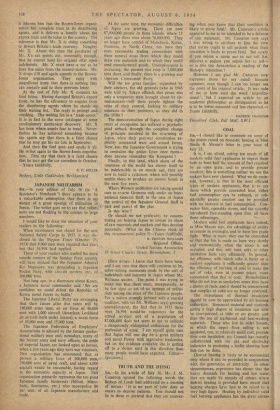TRUTH AND THE DYING
ing when you know that their condition is likely to prove fatal.' Mr. Cameron's article appeared to me to be intended to be a defence of this statement. Mr. Cameron now says I was wrong to attribute to him the view that nurses ought to tell patients when their condition is likely to prove fatal. But surely if you enjoin a nurse not to not tell (i.e. • deteive) a patient you enjoin her to ten- or is this too Aristotelian a reading of the Bishop's injunction ?
However I am glad Mr. Carheron now expresses more (to my mind) humane opinions; even though I can no longer see the point of his original article. It was rude of me to have used the word ' unprofes- sional '; but I expected an article by an academic philosopher as distinguished as he is to be better reasoned and less rhetorical.— Yours faithfully,
MAURICE CRANSTON
Travellers' Club, Pall Mall, S.W.1


































 Previous page
Previous page